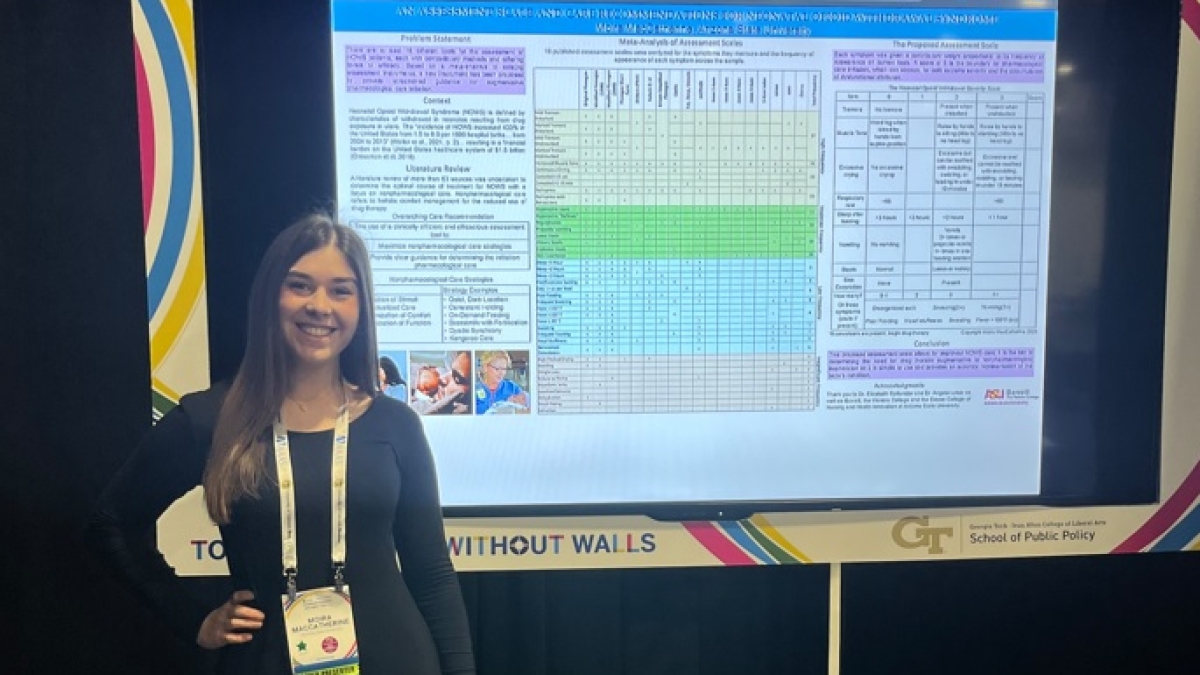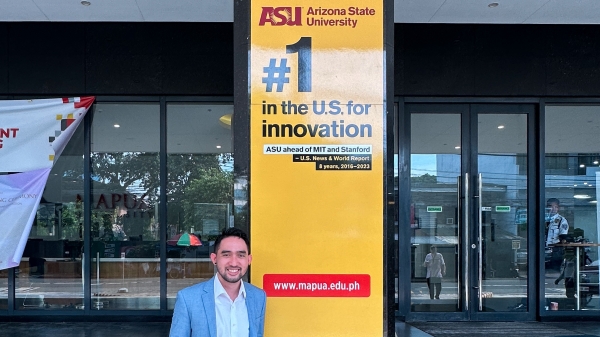Nursing student wins top award for research on neonatal opioid withdrawal

ASU sophomore nursing student Moira MacCatherine recently won first place for undergraduate research in the Medicine and Public Health category at the American Association for the Advancement of Science conference for her project titled “An Assessment Scale and Care Recommendations for Neonatal Opioid Withdrawal Syndrome.” Courtesy photo
An experience Moira MacCatherine had as a teenager volunteering in a Level III neonatal intensive care unit impacted her in such a way that it would later inspire her research as a nursing major at Arizona State University.
“Part of my role was comforting the infants. I distinctly remember my first interaction with a NOWS (neonatal opioid withdrawal syndrome) patient because he was completely inconsolable, had a very high-pitched shriek, and was tremoring in my arms," MacCatherine recalled. "It broke my heart to hold that baby in his condition."
Afterward, MacCatherine set out to learning everything she could on NOWS with the intention of helping others suffering from the same syndrome.
Now an ASU sophomore, MacCatherine recently won first place for undergraduate research in the Medicine and Public Health category at the 2024 American Association for the Advancement of Science (AAAS) Annual Meeting for her project titled “An Assessment Scale and Care Recommendations for Neonatal Opioid Withdrawal Syndrome.”
NOWS occurs in infants going through withdrawal after forming a substance dependency in utero. MacCatherine aims to provide recommendations for holistic and individualized infant care plans that include non-pharmacological and pharmacological strategies and assessment tools.
The assessment tool she produced is a meta-analysis of 18 tools currently published. She will work toward getting her research published and the tool she developed clinically tested for efficacy before it can be implemented in a health care setting.
A student in Barrett, The Honors College at ASU, MacCatherine is using her research as the topic of her honors thesis. She said that, through her research, she has learned much about neonatal assessment and care strategies that will help guide her toward a career as a neonatal nurse practitioner.
In addition to winning a research award, a highlight of the AAAS conference, held in Denver, Colorado, earlier this spring, was being among a group of students who met ASU President Michael Crow, MacCatherine said.
“He was very inquisitive about what each of us studied and offered individual advice based on our programs. When I stated my future goals of becoming a neonatal nurse practitioner, he took additional time with me to discuss possible program options at ASU. I was so appreciative of his time and effort to connect with me,” she said.
About a week after the conference, MacCatherine received a personal letter from Crow acknowledging the importance of her research and congratulating her.
“Your work on neonatal opioid withdrawal is innovative, timely and increasingly valuable, and very worthy of the first place in Medicine and Public Health as an Undergrad Award — congratulations. Thank you for producing research aimed at benefiting some of the most vulnerable members of society by providing a clear and cohesive approach to help caregivers better address their situation and meet their needs, and thank you for modeling ASU student-researcher excellence at AAAS,” Crow wrote.
“It was such an honor that he remembered our conversation about my research goals and congratulated me on my achievement at the conference," MacCatherine said. "Also, attending a multidisciplinary conference such as AAAS allowed me to meet people from around the world who study vastly different subjects. It was inspiring to learn about so many topics and contribute my own knowledge to conversations."
More Health and medicine
College of Health Solutions medical nutrition student aims to give back to her Navajo community
As Miss Navajo Nation, Amy N. Begaye worked to improve lives in her community by raising awareness about STEM education and health and wellness.After her one-year term ended last month, Begaye’s…

Linguistics work could improve doctor-patient communications in Philippines, beyond
When Peter Torres traveled to Mapúa University in the Philippines over the summer, he was shocked to see a billboard promoting Arizona State University.“It wasn’t even near the university,” said…

Turning data into knowledge: How Health Observatory at ASU aims to educate public
This is how David Engelthaler described his first couple of months on the job as executive director of the Health Observatory at Arizona State University:“It’s been a little bit of drinking from the…